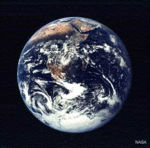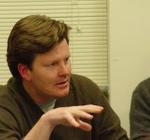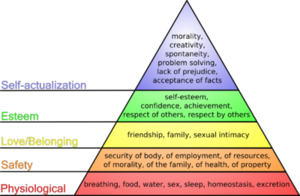Over at his site Global Guerillas John Robb has been getting halfway to wisdom. He has been asking the right questions. He has not been finding answers.
Robb covers the real world in which non-state actors are as important in foreign policy as state actors. This is a vital fact, and a basic mistake made by the Nixon Thesis in its 40-year conduct of foreign policy. Its medium is TV, and thus the Bush people react only to people and actions that get on TV. Their great "success" in Iraq has been in keeping so much of it off TV, so that most people here still don’t know what is happening there, or what our true position is.
In a TV world governments are on TV but their opponents are not, unless those opponents either directly threaten the government or do something so enormous as to become TV terrorists. This is not the real world. As Robb notes continually the real world is mostly not on TV. Controlling a corrupt Mexican government doesn’t mean the border is safe. It’s not a question of left or right, because a nominally-leftist Brazilian government faces the same problems. So does the nominally Democratic Nigerian government.
This is the world we face even if we get out of Iraq tomorrow. We cannot just deal with the people who appear on TV. I’m certain all these anti-government groups use the Internet, if only by cellphone. So here is the first principle of an Open Source Foreign Policy.
Anyone, any movement that can reach the net is something that must be dealt with in our foreign policy.
This will require a far more complex and nuanced foreign policy than any which has been articulated until now, by any party. It requires that we offer a combination of carrots-and-sticks — accommodation, negotiation, police action, covert action, military action — that will change with the reality of the threat.
It also means we have a different goal. Our goal in the TV era was to beat the other, to win. If we’re dealing with everyone, both governments and their opponents, legal or illegal, then we have a different goal. That is, to encourage calm, to encourage growth, to encourage the conditions that bring people and nations into the 21st century. To nurture the world, not just ourselves.
Right now only an elite live in 21st century conditions. I live in
it, and you probably do too. The vast majority of Americans now live in
the 21st century, although there are some people — on reservations, in
ghettos, or deliberately isolated — who live in earlier times. You may have neighbors like this. The
same is true in Japan, in most of Europe, in the great cities of the
world, in the resorts where the people of those cities vacation. It’s
not something you can map, precisely, because there are cities like Sao
Paolo that are nominally within the 21st century but which obviously
have millions of residents who are not.
People who live in the 21st century have something to lose. Long
life. Comfort. Intellectual and physical stimulation that pleases. We
are, on the whole, near the top of Maslow’s Hierarchy of Needs. We live at the top of his pyramid.
This does not describe conditions for most human beings today. Most
people still live further down that hierarchy. You can’t have a
democracy where most people are dealing with basic physiological needs
for food, air, and clean water. You can’t build a 21st century economy
where most people are concerned constantly with their personal safety.
It is only when things like esteem and self-actualization come into
play that you’re ready for the Internet economy, and that’s where we
want you.
Now here’s the nasty truth. This world cannot survive half-rich and
half-poor. The poor have it within their hands — through sheer force
of numbers — to destroy the rich, and to destroy the planet. The lesson of the Global Guerillas
is that they are learning this, and using 20th century technology
(guns, chemicals, publishing) to threaten the rest of us in new ways. They are bringing the underlying reality more urgently to our attention.
Ultimately the only answer is to expand the 21st century world until
it encompasses everyone who wishes to be in it. But in the shorter run
some groups and movements must be confronted, and fought in creative
ways. There are many ways to fight them:
- We can take away their issues.
- We can use police action against them.
- We can infiltrate them.
- We can stage political campaigns against them.
These are all tools that reduce the number of insurgents and reduce
their support among people who, at the end of the day, mainly want the
same 21st century life we have. Not just our freedom, but our WiFi and latte and
YouTube. We have to separate those who want to join the 21st century
from those who wish to destroy it, isolate those true enemies, and
either convert them, coerce them, or confront them.
This great task only begins when you accept an Open Source Foreign
Policy. Immediate positive results will be few. It means we use all our
weapons — economic,
invention, persuasion, diplomacy —
and seek simple goals:
- Do less harm in the world, by moving toward a hydrogen economy.
- Bring people up in the world, by expanding the 21st century’s borders.
- Save the world, through direct environmental action that depends on 21st century knowledge.
This struggle against earlier times is taking place against the
backdrop of the absolute necessity of saving the planet, or restoring
the balance. The two struggles are intertwined, they cannot be
separated.
This mix of goals and methods, this assumption of messy progress and
defeat, this is a more mature view of the same "Global War on Terrorist
Jihadists" that Bush people have been pushing on us for years.
Confronting and defeating that TV-era view of the world is the first
step we must take in an Open Source Foreign Policy.
But it is only the first step. And success with it will not guarantee a better life for anyone, right away.















Dana, are you familiar with the work of Thomas P. M. Barnett? He has written two books – The Pentagon’s New Map and A Blueprint For Action – and is a principal of Enterra Solutions, a consultancy that is the very embodiment of open-source foreign policy.
Here’s his blog: http://www.thomaspmbarnett.com/weblog/
Here’s Enterra’s site:
http://www.enterrasolutions.com/
Tom has a new home page you can get to from his blog, where you can get to everything else he’s ever touched , but it could use a little bit of art direction. I hope you can see past that to the ideas, which I think are very good and right in line with what you’re proposing.
Dana, are you familiar with the work of Thomas P. M. Barnett? He has written two books – The Pentagon’s New Map and A Blueprint For Action – and is a principal of Enterra Solutions, a consultancy that is the very embodiment of open-source foreign policy.
Here’s his blog: http://www.thomaspmbarnett.com/weblog/
Here’s Enterra’s site:
http://www.enterrasolutions.com/
Tom has a new home page you can get to from his blog, where you can get to everything else he’s ever touched , but it could use a little bit of art direction. I hope you can see past that to the ideas, which I think are very good and right in line with what you’re proposing.